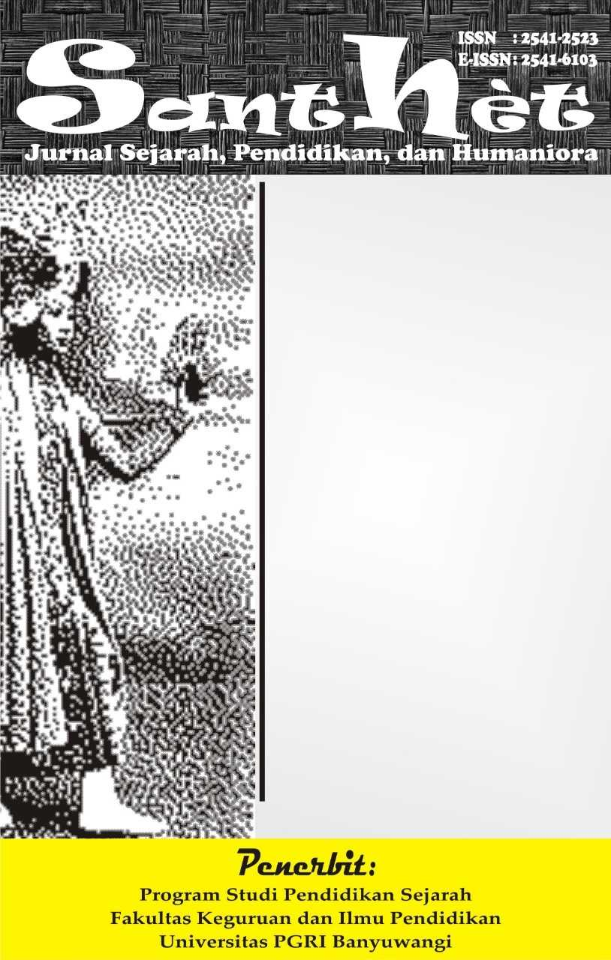The Effect of Project Based Learning (PjBL) Model On Students’ Chronological Thinking Ability at SMKN 11 Pandeglang
Pengaruh Model Project Based Learning (PjBL) terhadap Kemampuan Berpikir Kronologis Siswa di SMKN 11 Pandeglang
DOI:
https://doi.org/10.36526/santhet.v9i6.5224Keywords:
Learning Model, Project Based Learning, Chronological Thinking AbilityAbstract
The purpose to be achieved in this study is to determine the effect of project-based learning (PjBL) model on students' chronological thinking ability at SMKN 11 Pandeglang. The methodology used in the research is a quasi-experimental method with a “pretest postest control group design” which consists of two class groups, namely the experimental class and the control class. The research population used is class XI students of SMKN 11 Pandeglang. Statistical data analysis used in proving the hypothesis using the independent sample t-test formula with the criteria for success if the significance value (2-tailed) <0.05. The results obtained from this study are sig. (2-tailed) value of 0.000 <0.05 then H_a is accepted and H_0 is rejected. Thus it can be concluded that the project-based learning model has an influence on students' chronological thinking ability. This shows that students' chronological thinking ability using the project-based learning model is higher than the discovery learning model seen from the acquisition of the average student score after the test in the experimental class of 82.44 and the control class of 72.48. The indicators of chronological thinking skills tested in this study are the ability to understand the concept of time, the ability to read the timeline, the ability to distinguish between the past, present and future, the ability to sequence historical events, and the ability to analyze historical events.
References
Al-Tabany, T. I. (2014). Mendesain Model Pembelajaran Inovatif, Progresif dan Kontekstual: Konsep, Landasan, dan Implementasinya pada kurikulum 2013 ( kurikulum tematik Integratif). Prenadamedia Group.
Antopani, H. (2016). PENGGUNAAN MEDIA TIME LINE UNTUK MENINGKATKAN KEMAMPUAN BERPIKIR KRONOLOGIS SISWA DALAM PEMBELAJARAN SEJARAH (Penelitian Tindakan Kelas di Kelas XI IIS 1 SMA Negeri 11 Bandung). UNIVERSITAS PENDIDIKAN INDONESIA.
Arikunto, S. (2013). PROSEDUR PENELITIAN Suatu Pendekatan Praktik (Edisi Revisi VI). PT Rineka Cipta.
Dara, M. C., & Setiawati, E. (2017). PENGARUH PENGGUNAAN MEDIA TIMELINE TERHADAP KEMAMPUAN BERPIKIR KRONOLOGIS PEMBELAJARAN SEJARAH DI SMAN 2 METRO. HISTORIA, 5(1), 55. https://doi.org/10.24127/hj.v5i1.733
Daryanto. (2014). Pendekatan Pembelajaran saintifik kurikulum 2013 . Gava Media.
Hanafiah. (2012). Konsep Strategi Pembelajaran. Refika Aditama.
Hosnan. (2014). Pendekatan Saintifik dan Kontekstual dalam Pembelajaran Abad 21. Ghalia Indonesia.
Ismail, F. (2018). Statistika Penelitian Untuk Penelitian Pendidikan dan Ilmu-Ilmu Sosial. Prenadamedia Group.
Kochhar, S. K. (2008). Pembelajaran Sejarah Teaching of History. PT Grasindo.
Komalasari, K. (2017). Pembelajaran kontekstual : konsep dan aplikasi. Refika Aditama.
Kuntowijoyo. (2013). Pengantar Ilmu Sejarah. Tiara Wancana.
Rusman. (2016). MODEL-MODEL PEMBELAJARAN Mengembangkan Profesionalisme Guru. PT Raja Grafindo Persada.
Sanjaya, W. (2021). Penelitian Pendidikan: Jenis, Metode, dan Prosedur. Kencana.
Sardiman. (2012). Interaksi dan Motivasi Belajar Mengajar. Raja Grafindo Persada.
Sugiyono. (2016). METODE PENELITIAN Kuantitatif, Kualitatif, dan R&D. Alfabeta.
Sugiyono. (2017). METODE PENELITIAN Kuantitatif, Kualitatif, dan R&D. Alfabeta.
Sujana, A. (2020). Model-Model Pembelajaran Inovatif: Teori dan Implementasi. PT Raja Grafindo Persada.
Wena, M. (2012). Strategi Pembelajaran Inovatif Kontemporer. Bumi Aksara.
Winarto, H. (2014). Penggunaan Media Timeline untuk Menumbuhkan Kemampuan Berpikir Kronologis Siswa dalam Pembelajaran Sejarah [Universitas Pendidikan Indonesia Bandung]. https://eje.bioscientifica.com/view/journals/eje/171/6/727.xml





























